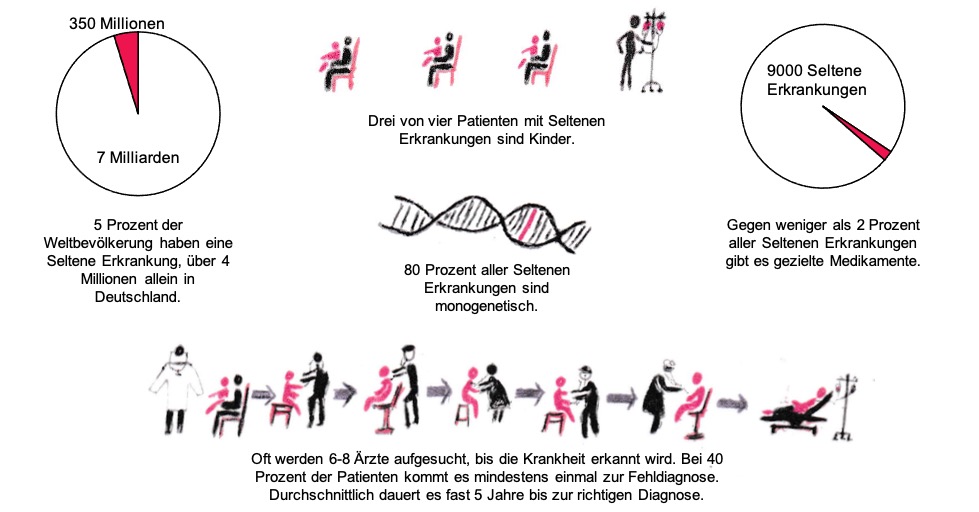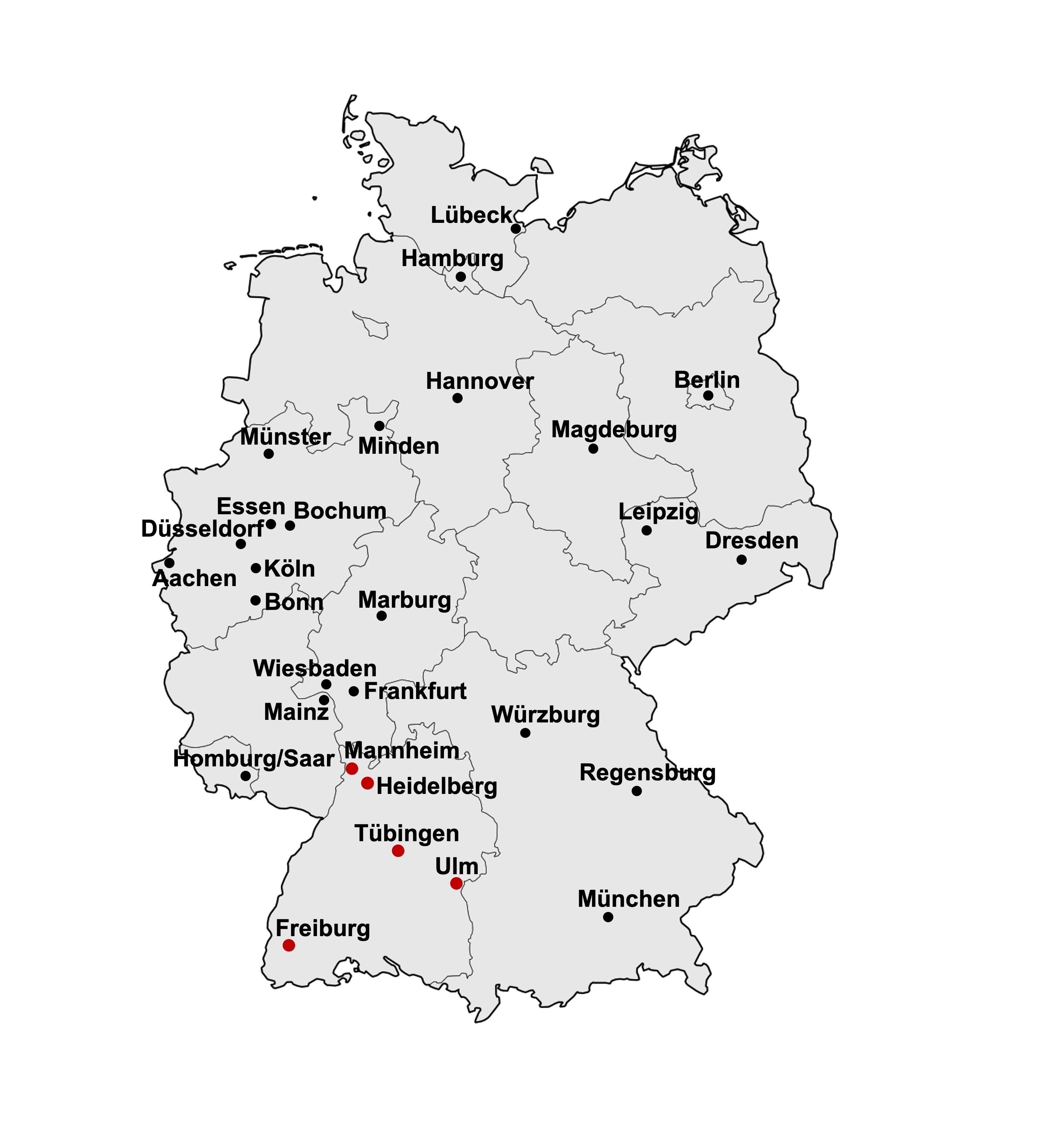Development of the genomDE genome database
Whole genome sequencing for diagnosing rare diseases
Grouped together, rare diseases are by no means a rare phenomenon; however, they are rarely correctly diagnosed and rarely properly treated. In most cases, there is no effective medication available. Rare disease centres staffed by experts have been set up in many German cities to speed up the often long and painful search for the right diagnosis and treatment. Whole genome sequencing is a component of general healthcare, used to identify genetically determined diseases. It is planned to establish a central database called genomDE, which will be used to link genetic and clinical data and improve the diagnosis, prevention and treatment of rare diseases, especially those affecting children.
In Germany, four to five million people - mainly children - suffer from a rare disease. In the EU, a condition is defined as rare disease when it affects 5 or fewer people in every 10,000. Although each individual disease is rare, when combined they are by no means a rare phenomenon. Approximately 9,000 different rare diseases have been described in the medical literature up to 2020, and the number is increasing every year. However, only 160 orphan drugs have been approved as targeted drugs for just 130 of the thousands of diseases. No effective medication is available for adequately treating the vast majority of rare diseases.
 Rare diseases: rarely recognised - rarely correctly diagnosed - rarely effectively treated. (based on various statements and illustrations available on the internet in 2020) © EJ (based on information and figures found in the Internet 2020)
Rare diseases: rarely recognised - rarely correctly diagnosed - rarely effectively treated. (based on various statements and illustrations available on the internet in 2020) © EJ (based on information and figures found in the Internet 2020)
Years-long odyssey from one doctor to the next
 Black dots: Centres for rare diseases (ZSE – Zentrum für Seltene Erkrankungen) in German cities. Red dots: The ZSEs pooled in the Baden-Württemberg Competence Centre for Rare Diseases. © BIOPRO Baden-Württemberg GmbH
Black dots: Centres for rare diseases (ZSE – Zentrum für Seltene Erkrankungen) in German cities. Red dots: The ZSEs pooled in the Baden-Württemberg Competence Centre for Rare Diseases. © BIOPRO Baden-Württemberg GmbHHowever, it is not just the lack of therapeutic options that is problematic, but also the frequently incorrect diagnosis or a diagnosis that comes much too late, explained Eva Luise Köhler, patron of the patient network ACHSE e.V. (Alliance of Chronic Rare Diseases). As each disease is so rare, most doctors are not familiar with the symptoms. On average, it takes five years or more for a rare disease to be correctly diagnosed; during this time, a patient sees up to eight different doctors. Almost half of the patients, most of whom are children, are misdiagnosed at least once.
Centres for rare diseases (ZSE) have been established in many large German cities in order to spare patients and their relatives a frustrating odyssey from one doctor to the next, accompanied by often unsuccessful and agonising attempts at treatment. The ZSEs at the five university hospitals in Baden-Württemberg (Freiburg, Heidelberg, Mannheim, Tübingen and Ulm) have joined forces in the Baden-Württemberg Rare Diseases Competence Centre funded by the Baden-Württemberg government. The combined clinical experience in this centre - in conjunction with comprehensive and searchable information on rare diseases - not only potentially accelerates the process of finding the correct diagnosis, but also identifies experts who can provide specific treatment for each particular disease.
The genomDE genome sequencing platform
The German Federal Ministry of Health (BMG) is planning to ensure that genome sequencing, together with comprehensive education and counselling, will in future significantly contribute to personalised patient care. The BMG’s aim is to fund the establishment of genomDE, a central, Germany-wide database for whole genome sequencing (WGS). GenomDE will be linked with clinical and phenotypic data and improve the diagnosis, prevention and ultimately treatment of genetic diseases. The aim is to introduce medical genome sequencing into the general healthcare system, thus benefitting patients and their families. Using WGS-supported diagnostics, it is even possible to find the causes of extremely rare disease patterns that have very few identical cases. The database will also serve a scientific purpose and be used, for example, to investigate the connections between genetic mutations and disease patterns. It will also be useful for diagnosing cancer, in particular for identifying the - relatively rare - genetically determined cancer subgroups, where in some cases specific highly effective antibodies and other therapeutic agents already exist as treatment options (personalised medicine).
The Treatment and Research Centre for Rare Diseases at the University Hospital of Tübingen (ZSE Tübingen), together with the TMF (Technology and Methods Platform for Networked Medical Research) and the IGES Institute (Infrastructure and Health) in Berlin – has carried out a study to determine how genomDE needs be designed and operated in compliance with legal and ethical standards. In late 2019, Dr. Holm Graeßner, managing director of the ZSE Tübingen and head of the research management unit at the Institute of Medical Genetics and Applied Genomics at the University Hospital of Tübingen, presented the study. As part of the Baden-Württemberg Health Location Forum, Graeßner is also setting up a Clinical Counselling Centre for Rare Diseases, funded by the Baden-Württemberg Ministry of Social Affairs and Integration. He is working in cooperation with the Institute of Medical Genetics and Applied Genomics and its medical director, Prof. Dr. Olaf Rieß. Graeßner and Rieß also work closely together on the board of the Society for the Promotion of the ZSE Tübingen.
The genomDE genome sequencing platform will take into account the experience of other countries (such as the UK, the Netherlands, France and Sweden), some of which are way ahead of Germany as regards the medical use of genome data. For example, Great Britain already initiated the Genomics England programme in 2009 and is now the undisputed international leader in the field of genomic medicine. Nowadays, patients who are believed to be carrying mutations associated with a rare disease undergo whole genome sequencing as part of standard care. Prof. Dr. Hans-Hilger Ropers, emeritus director of the Max Planck Institute for Molecular Genetics and one of the initiators of the genomDE project, commented ironically that, as a late starter, Germany at least has the opportunity to avoid the mistakes made by other countries.
The data will be stored in genomDE in pseudonymised rather than anonymised form. Although basic research would also be possible with anonymised data, patients can only benefit from scientific findings if they are identifiable. It goes without saying that data protection issues will be taken into account. Every diagnostic whole genome sequencing procedure will have to be preceded by a detailed, competent consultation where the patient can discuss which unexpected findings he or she wants to be informed about and which not. This is particularly important in view of the fact that there may be no effective therapies available for the genetic defects identified.
National and European initiatives
Artificial intelligence and big-data applications will be used for genome sequencing in the standard care sector. The genomDE genome initiative should also be seen in the context of the measures that the German federal and state governments are implementing to advance the digitalisation of the healthcare system. According to the German Federal Minister of Health, Jens Spahn, genomDE is a knowledge-generating care concept which will take healthcare in Germany to a new level. It will also be linked to pan-European activities. When the new European Commissioner for Health and Food Safety, Stella Kyriakides, made her inaugural visit to Germany in early 2020, Spahn and Federal Research Minister Anja Karliczek signed a declaration of cooperation in the '1+Million Genomes' EU genome initiative, which aims to sequence at least one million human genomes in the EU by 2022 and use them for genomic medicine. The Federal Ministry of Health has issued an invitation to a non-public online conference on 30 November 2020, where it will present genomDE in the context of the 1+Million Genomes project and deal with its potential for genomic medicine: personalised medicines and therapies, targeted prevention and precise diagnosis - especially for cancer and rare diseases.